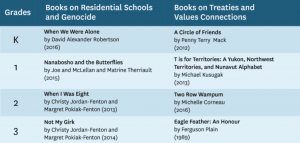I came across this article that focuses on truth and reconciliation from K-12. This article discusses how teachers can become an ally. There were a couple of things that stood out to me. Firstly, I thought it was extremely useful and helpful that there was a complete list of books from K-12 that teachers can use and read in their classrooms to teach students about reconciliation. I appreciate that there are two books for each grade, however I wish there were more than just two. Hopefully in the near future there will be tons more books available that we can use in the classroom. Below are the books for primary classes.

Another section of this article that grabbed my attention was The Sacred Circle. This circle could help educators learn how to become an ally through the spiritual, physical, emotional, and intellectual teaching. According to this article by Dr. Pamela Rose Toulouse (2018),
“The spiritual invites the educator to examine all the opportunities that their lessons, field trips and experiential learning activities offer to link students to each other, their communities and the globe. This aspect of holism in teaching/learning places emphasis on activities that develop deep and meaningful connections with a purpose “greater than the self.”
The physical refers to the classroom space/s where learning takes place and encourages differentiated practices outdoors and in the community. This aspect of holism encourages teaching/learning at sites that make connections to local events, people, places and movements
The emotional concerns the inclusion of Elders, Métis Senators, Cultural Resource People, families and non-human experiences as foundational to the classroom and school year. This aspect of holism values the knowledge that “other teachers” bring to the shared world of education.
The intellectual refers to the provincial/territorial mandated curriculum that the educator is entrusted with delivering to the students. This aspect of holism calls upon the educator to factor in inquiry, curiosity and differentiated evaluation as critical to meaningful student experiences in school” (para. 12).
The more we know, the more we can do. It starts with us, as educators, to have a role to play in this learning process and journey towards truth and reconciliation.